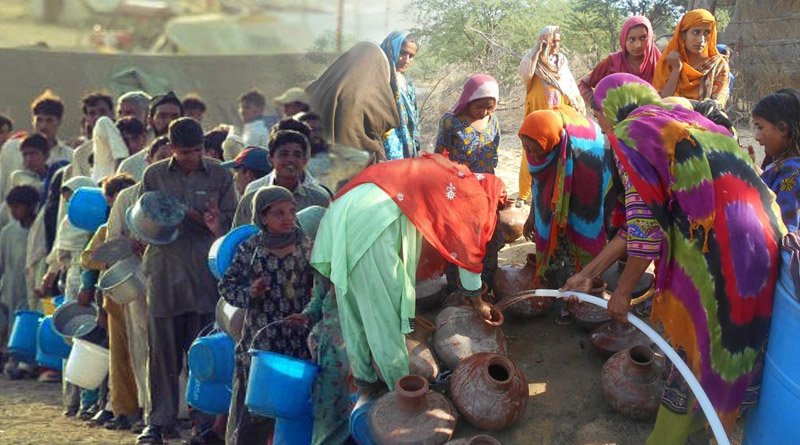Pakistan was listed as one of 23 countries with “critically water insecure” in a report by the United Nations Institute of Water, Environment, and Health.

Pakistan was listed as one of 23 countries with “critically water insecure” in a report by the United Nations Institute of Water, Environment, and Health. According to the Global Water Security 2023 Assessment published on Thursday by the UN University, 33 countries from three different geographic regions had high levels of water security. However, all regions had countries with low levels of water security.
In a press release announcing the report, it was stated that the most recent assessment of the world’s water resources, conducted by United Nations water experts, revealed that access to managed drinking water and sanitation was “still a pipe dream for more than half of the world’s population, as more than 70%, or 5.5 billion people, do not have safe water access, with Africa having the lowest levels of access, at only 15% of the region’s population.”
“Currently, three out of every four people reside in nations with water scarcities. Compared to water-related disasters, more people die because of a lack of access to safe drinking water, sanitation, and hygiene (WASH) services “stated in the press release.
A majority of the world’s population, according to experts, is currently residing in water insecure countries, including the Solomon Islands, Eritrea, Sudan, Ethiopia, Vanuatu, Afghanistan, Djibouti, Haiti, Papua New Guinea, Somalia, Liberia, St. Kitts and Nevis, Libya, Madagascar, South Sudan, Micronesia, Niger, Sierra Leone, Yemen, Chad, Comoros, and Sri Lanka.
Water security is essential to development, so this is a major cause for concern, according to the press release.
Along with other European nations like Denmark, Luxembourg, Austria, Norway, Switzerland, Finland and Iceland, Ireland, France, Lithuania, Greece, Germany, the UK, Estonia, Italy, Latvia, Spain, Slovakia, Slovenia, Croatia, Czechia, Hungary, and Portugal, the report ranked Sweden as the nation with the highest level of water security.
It was noted that the only nations to qualify for the water secure group in the Americas were Canada and the United States, while the water secure countries in the Asia Pacific region included New Zealand, Cyprus, Australia, Japan, Israel, Kuwait, and Malaysia.
The assessment found that abundant natural water availability does not guarantee water security, as many countries with abundant freshwater resources have high rates of WASH-attributed deaths due to limited WASH access, poor water quality, and low economic value.
The global assessment, which was conducted halfway through the Water Action Decade (2018-2028) and the 2030 Agenda for Sustainable Development, provided a “multidimensional comparison” of the state of water security affecting 7.8 billion people across 186 countries, according to the report’s additional findings.
According to the press release, “the report presents some very alarming statistics, arguing that the world is far from achieving ‘clean water and sanitation for all,’ known as the sustainable development goal (SDG) number six.
The UN report examined water security in 10 areas to give a more “realistic understanding of the water security status around the world”: drinking water, sanitation, good health, water quality, water availability, water value, water governance, human safety, economic safety, and the stability of water resources according to the statement.
According to the press release, “The results were worrying: 78 percent of the world’s population (6.1 billion people) currently live in water insecure countries.” According to the report, Africa had the least safe WASH services globally, which contributed to the area’s poor water security.
In 54 African nations, including 33 of the least developed and six Small Island Developing States (SIDS), it was stated that nearly 31% (over 411 million) of the population lacked access to a basic drinking water service. “Only 201 million people (15%) have access to drinking water that is safely managed. When it comes to sanitation, 1.1 billion people (82 percent) still lack access to a properly run sanitation service “Added in the press release.
Therefore, it claimed that more people perished globally due to a lack of safe WASH services than from water-related disasters.
Alarmingly, the situation is not getting any better: According to estimates from the World Health Organization (WHO), WASH-related deaths rose in 164 countries in 2019 compared to those estimated in 2016.
The press release also stated that it was still difficult to accurately and completely assess the water quality at the national level. Although there are exceptions in all regions, the press release stated that the level of domestic wastewater treatment, as determined by WHO using household sanitation statistics, “remains very poor (below 30pc) in Africa and large portions of the Asia-Pacific, and poor (below 50pc) in most South American countries.